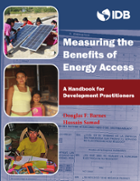Measuring the Benefits of Energy Access: A Handbook for Development Practitioners
Date issued
Dec 2018
Subject
Energy Efficiency;
Rural and Urban Development;
Electricity Service;
Impact Evaluation
JEL code
Q49 - Energy: Other;
D63 - Equity, Justice, Inequality, and Other Normative Criteria and Measurement;
Q42 - Alternative Energy Sources;
Q48 - Government Policy;
Q18 - Agricultural Policy • Food Policy
Category
Monographs
Impact evaluation has gained recognition over the last decade as an essential component of project development. Impact evaluation details how and to what extent policies and project interventions contribute to socioeconomic welfare gains or losses for society. Such evaluations are also important for identifying key lessons for future policies and investments. In the case of modern energy access, the measurement of costs is fairly straightforward. However, measuring the benefits to society is more difficult and might involve implementing national or regional surveys. Past efforts have often underestimated the complex linkages of benefits produced by programs involved in providing electricity and clean cooking energy to rural and other populations without access to modern energy services. Thus, it has often been difficult to balance the costs of program investments in energy access vis-à-vis their benefits. This study’s main objective is to develop a practical method by which to measure the benefits of rural energy, including both electricity and clean cooking. The methods reviewed in this report involve both formal and informal techniques of data collection, including quantitative and qualitative methods of analysis. The research pays attention to such concepts as quality of life, effects on education, and other key components of social development; that is, it tackles those benefits of modern energy access that traditionally have been difficult to measure, as well as the easier-to-measure benefits.
Generative AI enabled




